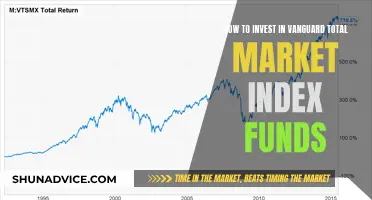
Investing in mutual funds can be a powerful tool for wealth creation, especially in a country with a growing economy and a burgeoning middle class. The simple answer to the question of when to start investing in mutual funds is: the sooner, the better.
One of the most compelling reasons to start investing in mutual funds early is the power of compounding. Compounding refers to earning returns not just on your initial investment but also on the returns generated over time. The longer your money remains invested, the greater the compounding effect.
However, there are risks involved in investing in mutual funds, and these can be mitigated by conducting proper due diligence. It is important to know your financial goals, risk tolerance, and the track record and future projections of your preferred mutual funds.
What You'll Learn

Compounding benefits of starting early
Investing in mutual funds is a relatively safe option, offering diversification across multiple sectors and assets, reducing the risk of losses. They are usually managed by experienced professionals, regulated, transparent, cost-effective, and highly liquid.
However, there are times when mutual funds may not be the best option, such as when management fees are high, or for investors who want total control over their holdings.
Now, onto the benefits of compounding when starting early:
Compounding is a powerful way to grow your wealth over time. It is the process of earning interest on interest, which can lead to exponential growth. The power of compounding is best harnessed by starting early, giving your money more time to grow. The longer your money is invested, the more it can grow.
For example, let's say you invest Rs. 1,00,000 today at an annual interest rate of 12%. After 5 years, your investment would have grown to approximately Rs. 1,76,234. This is the power of compounding at work.
The key to maximising the benefits of compounding is to start as soon as possible. The earlier you begin, the more time your investments have to grow and multiply. This is especially beneficial when investing in mutual funds, as the fund managers reinvest the profits, further accelerating the growth of your investment.
Here's another example to illustrate the power of compounding over time:
Suppose you have three friends, Ajay, Vijay, and Ram, who want to start investing for their retirement. Ajay starts investing INR 2,000 per month at age 25 until he retires at 60. Vijay and Ram start investing 5 and 15 years later than Ajay, respectively. Even if all three friends earn the same rate of returns per annum, Ajay, who started early, will have a much larger corpus at retirement.
Therefore, starting early and giving your investments a longer horizon to grow is a great way to build a considerable corpus to achieve your financial goals.
To summarise, the benefits of compounding when starting early are:
- Maximises the effect of compounding, giving your money more time to grow.
- Allows your investments to benefit from reinvested returns, leading to accelerated wealth accumulation.
- Provides a solid base for your wealth to grow over time.
- Helps you achieve your long-term financial goals.
- Reduces the impact of market volatility over time.
- Enables you to build a considerable corpus for retirement or other financial goals.
Mutual Funds in India: Invest Without a Broker
You may want to see also

How to choose the right asset
When choosing the right asset for mutual funds, there are several factors to consider. Here are some key points to help guide your decision:
Investment Objectives and Timeframe
Firstly, define your investment objectives clearly. Are you investing for the short, medium, or long term? Do you want to save for retirement, finance a child's education, or purchase a property? Different mutual fund categories cater to diverse goals, so understanding your objectives will help you select the most suitable option.
For instance, equity funds are typically recommended for long-term goals (over five years) due to their potential for higher returns, while debt funds are more suitable for shorter horizons (one day to five years) with lower risk. Liquid funds are ideal for very short-term financial needs (one day to three months), and ultra-short-duration funds are designed for periods of three months to one year.
Risk Tolerance
Understanding your risk tolerance is crucial when selecting a mutual fund. The Securities and Exchange Board of India (SEBI) categorises funds into five levels of risk, from low to high. You should choose a fund that aligns with your comfort level and doesn't expose you to undue stress.
For example, if you're a conservative investor, consider low-risk options like liquid or ultra-short-term funds. Conversely, if you're an aggressive investor, you may opt for sectoral or thematic funds, which focus on specific industries or themes and offer high returns with high risk.
Investment Strategy and Performance
It's important to understand the investment strategy of the mutual fund, such as growth, dividend, or index-focused approaches. Choose a fund that aligns with your investment style and preferences.
Evaluate the fund's performance by comparing its returns and risks with its benchmark and peer group. Look for consistent and superior long-term returns, but remember that past performance doesn't guarantee future results, so review the fund's performance periodically.
Expense Ratio and Exit Load
The expense ratio is the annual fee charged by the mutual fund for managing your money, covering costs like management and distribution fees. A higher expense ratio reduces the net return, so opt for funds with lowersection> expense ratios.
Exit load is the fee charged when you sell units of the mutual fund, also reducing your net return. Consider funds with no or minimal exit loads, but keep in mind the liquidity and lock-in period of the fund.
##section> Tax Implications
Different types of mutual funds have varying tax implications. For example, short-term capital gains (held for less than one year) in equity funds are typically taxed at 15%, while long-term capital gains (over one year) may be tax-exempt up to a certain threshold and then taxed at a lower rate.
Direct Plans
Direct plans allow you to invest directly in the mutual fund without intermediaries, resulting in lower expense ratios as there are no commission or distribution fees. This means higher potential returns, as the savings are added to your gains.
In summary, choosing the right asset for mutual funds requires careful consideration of your financial goals, risk tolerance, investment strategy, fund performance, fees, and tax implications. Conduct thorough research, and if needed, consult a financial advisor to make informed decisions.
BlackRock MuniHoldings Investment Quality Fund: Symbol and Significance
You may want to see also

The importance of investing regularly and diligently
Investing in mutual funds is a long-term journey, and it is important to invest regularly and diligently. Here are some reasons why:
Compounding and Wealth Creation
Delaying investments can significantly impact your wealth creation journey. Starting early allows you to take advantage of compounding returns over a more extended period. The power of compounding is a crucial factor in growing your investments. The longer your investment horizon, the more time your money has to grow and benefit from compounding. For example, consider three individuals who start investing at different ages. The one who starts at 25 with a smaller amount will end up with a larger corpus than those who start later, even if they invest a higher amount.
Rupee Cost Averaging
Investing a fixed amount regularly through Systematic Investment Plans (SIPs) helps reduce the risk of market volatility. When you invest a fixed sum periodically, you buy more units when the market is down and fewer units when the market is up. This strategy, known as rupee cost averaging, helps you get a better average price for your investments over time.
Discipline and Patience
Wealth creation through investing in mutual funds requires discipline and patience. Markets can be volatile in the short term, but by investing regularly, you benefit from buying at different price points. This strategy helps you avoid the temptation of timing the market and ensures you stay invested for the long term.
Professional Management
Mutual funds are managed by experienced professionals who make investment decisions on your behalf. They actively monitor the markets, conduct research, and rebalance the portfolio to meet the fund's objectives. This professional management ensures that your investments are in capable hands, allowing you to focus on your financial goals rather than day-to-day investment decisions.
Diversification
Mutual funds provide instant diversification across various sectors and asset classes, reducing the risk of losses due to poor performance in any single area. By investing in a wide range of securities, you lower the impact of any specific security or sector on your overall portfolio.
In conclusion, investing regularly and diligently in mutual funds is essential to benefit from compounding returns, rupee cost averaging, and professional management. It also helps you maintain discipline and patience in your investment journey, ultimately leading to long-term wealth creation.
Equity and Debt Funds: Diversifying Your Investment Portfolio
You may want to see also

The role of patience and discipline
Patience and discipline are key ingredients for a successful investing journey. Patience is critical for long-term investing success. The longer your money is in the market, the more time it has to grow. Investing is not a get-rich-quick scheme but a long-term strategy that requires patience and perseverance.
Section 1:
When it comes to investing in mutual funds, it is important to remember that it is a long-term game. The market can be volatile, and there will be ups and downs. However, those who invest with patience and discipline are more likely to see success in the long run. It is important to have a well-thought-out investment plan that outlines your goals and investment strategy, with a focus on the long term. This will make it easier to stay patient and disciplined throughout your investment journey.
Section 2:
Patience is crucial when riding out market volatility. The stock market can be unpredictable, even for experienced investors. Rather than trying to time the market, successful investors often find that the best course of action is to hold steady and wait for the market to rebound. This requires patience and discipline to avoid making emotional decisions that can lead to significant losses. It is important to block out the external noise and stick to your financial plan, avoiding short-term trends driven by greed for superlative returns.
Section 3:
In addition to patience, discipline is also essential for successful investing. Discipline is about having self-control and sticking to your investment plan, even when the market gets rocky. It is about making rational decisions based on research and analysis, rather than impulsive choices driven by fear or greed. Discipline also means avoiding unnecessary portfolio churning, which can trigger capital gains tax liabilities and transaction costs that eat into your overall returns.
Section 4:
Together, patience and discipline enable investors to endure long periods of underperformance and maintain a well-diversified portfolio. By investing systematically and regularly, regardless of market conditions, investors can reduce the risk factor and take advantage of compound interest. This disciplined approach ensures that investors do not miss out on potential gains by panicking and selling when the market dips.
A Guide to Index Fund Investment Strategies
You may want to see also

Understanding the pros and cons of mutual funds
Mutual funds are a popular investment option. They are a type of investment product where the funds of many investors are pooled into a product that is then used to invest in a group of assets. Here are some of the pros and cons of investing in mutual funds.
Advantages of investing in mutual funds:
- They offer a relatively easy way to invest. Actively managed funds involve a fund manager who will research investment options and make trades on your behalf. Passively managed funds are hands-off investment vehicles that don't require an active role.
- They are diverse by nature, which can help reduce investment risk. If certain fund assets decrease in value, gains in other areas can help offset those losses.
- They allow you to invest in a variety of securities you might not otherwise explore.
- They are considered safer than investing in individual stocks.
- They are a good option for those with a long investment timeline.
- They are a simple way to invest, requiring little involvement.
- They are a good option for those who want diversification.
Disadvantages of investing in mutual funds:
- There are no guaranteed returns.
- There is a minimum investment, which can range from $500 to $3,000.
- There are fees to consider, including load fees, operating expense ratios, and 12b-1 fees.
- They can be too hands-off for investors who like to be involved in trades and investment decisions.
- They can be high cost – some funds charge a high expense ratio, sometimes above 1% of your investment in the fund annually.
- They may not be tax-efficient – if the fund has sold assets and seen a gain, you might see distributions that create a taxable gain.
- They could underperform the market.
Overall, mutual funds can be a good investment for those looking to diversify their portfolios and reduce their investment risk. However, they also come with fees and potential tax implications, and they may not be suitable for those who want more control over their investments.
Liquid Fund Investment: Axis Liquid Fund Guide
You may want to see also
Frequently asked questions
Mutual funds are a popular investment option that pools money from multiple investors to purchase stocks, bonds, and other securities. They are usually managed by experienced professionals, reducing the risk of losses. Investing in mutual funds also provides diversification across multiple sectors/assets, further reducing the risk of losses. Mutual funds are regulated, adding a layer of safety, and are obligated to disclose their portfolio holdings and performance regularly, ensuring transparency. They are also cost-effective and have high liquidity.
Mutual funds may not be a good approach if you want to exercise total control over your holdings. The funds are managed by fund managers, and certain rules and regulations can dilute returns. High annual expense ratios, high load charges, and high fees when buying or selling shares are also not good signs.
The best time to start investing in mutual funds is as soon as possible. The power of compounding means that the longer your money remains invested, the greater the compounding effect. By starting early, you can also mitigate the impact of market fluctuations and benefit from rupee cost averaging.







